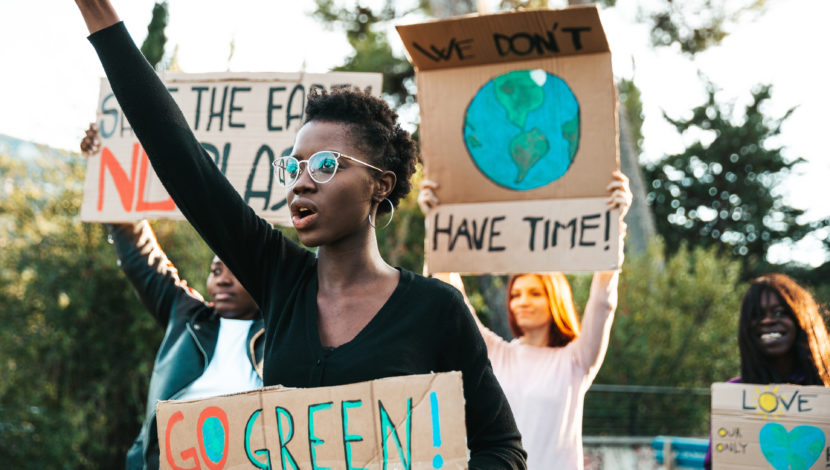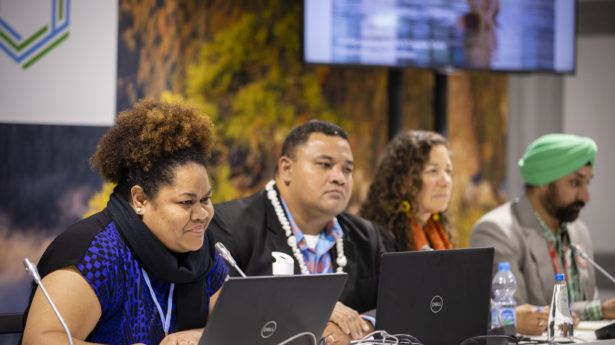The Unitarian Universalist Service Committee advances human rights through grassroots collaborations.
COP26 Failed to Protect Human Rights

By Salote Soqo on December 16, 2021
UUSC played an active role in ensuring that its partners from the Global South were able to attend the Conference of Parties this year to advocate for radical action in addressing climate change. The conference happened in early November; here is our analysis of how it turned out.
In early November, UUSC organized an official side event for the 26th Conference of Parties (COP26), an annual event that brings together climate justice activists and advocates, politicians, academics, international leaders, and non-governmental organizations to discuss the impacts of climate change and resolve to reduce our collective environmental impact. The side event featured a discussion on the intersectionality of loss and damage and climate-forced displacement. UUSC also supported seven of our partner organizations, helping them travel to Glasgow to advance climate justice.
UUSC’s priority was to ensure that those who were most impacted by the climate crisis were able to travel to and fully participate in COP26 activities. The inequitable distribution of the COVID-19 vaccine in the global south and the location of COP26 in the global north meant that COP26 was inaccessible for UUSC’s partners and the principles of equity and inclusion in the climate negotiations were already at risk.
UUSC’s advocacy at COP26 focused on three key themes:
- increasing funding commitments from large nations;
- deploying real and tangible actions to address loss and damage; and
- Enhancing commitments to keep the global temperature increase to 1.5℃ by the end of the century.
Though we were optimistic going into COP26, the outcome of the conference, referred to as the Glasgow Climate Pact, was disappointing to say the least.
Failure to Meet 1.5℃ Target
One of the main reasons COP26 was important was because Parties (nations) were expected to raise ambitions for emissions reductions. In 2015, Parties submitted their first National Determined Contributions (NDC) to document their commitments to reduce greenhouse gas emissions. At COP26, Parties were expected to submit new NDC’s to raise emissions reductions targets towards the goals of the Paris Agreement. However, despite the submission of new NDCs by 120 Parties prior to and during COP26, ambitions still fell short of reaching the 1.5℃ target. UN assessments project that even with new NDC’s, global temperature increase is expected to be 2.4℃ by the end of the century.
This scenario means catastrophic impacts for Mother Earth. For UUSC’s partners in the Pacific, Latin America, South Asia, the Caribbean and in the U.S., the gradual increase in global temperatures will see continued increases in the intensity and frequency of extreme weather, severe rainfall patterns, extreme drought, severe permafrost melt and rising sea levels that will undoubtedly threaten their survival and their ability to remain in their homes.
Climate-forced displacement is already a reality today and government’s must now prepare to develop policies and raise financial resources for dignified relocations and for migration beyond borders. Our role in supporting those most at risk of climate-forced displacement in shaping these policies and using our privilege to support our partners is more important now than ever before. Time is not on our side.
Inadequate Progress on Loss and Damage
A key demand from developing countries at COP26 was a dedicated loss and damage financing facility to support developing countries in addressing the impacts of climate change. Developed countries failed to meet this need. However, Scotland and the Wallonia region of Belgium dedicated $100 million to loss and damage. How this will roll out and managed is unknown at this point, but perhaps this provides a catalyst for other developed countries to step up. The operationalization of the Santiago Network on Loss and Damage, which came out of COP25 was also on the agenda at COP26. The network is envisioned to provide technical assistance to developing countries to help them address the risks of climate change impacts. At COP26, Parties made progress in defining the functions and form of the network and agreed to provide financial resources to support the network, but left the network’s institutional arrangements to be discussed at COP27.
The grave impacts of loss and damage on human rights requires much stronger progress than what came out of COP26, which overall seems out of touch with the realities happening on the ground. UUSC’s indigenous partners are also raising awareness about the gaps in knowledge and scope of the loss and damage agenda, particularly as it relates to non-economic loss and damage such as the loss of culture and deterioration of public health.
Disappointing Progress on Climate Finance
At COP15, wealthy countries pledged to raise $100 billion per year by 2020. This was a hard fought win by developing countries at COP15, which would provide the much-needed financial support that developing countries desperately needed for mitigation and adaptation. COP26 simply did not meet this goal. While some countries made new commitments at COP26, the goal of raising $100 billion annually still seems unattainable. The Glasgow Climate Compact only urges developed countries to “fully deliver” on the goal through 2025. Due to the advocacy of developing countries, the Glasgow Climate Compact urges developed countries to double the provisions of adaptation financing by 2025.
The catastrophic impacts of the climate crisis is well beyond the financial capacity of developing countries. This fact is pretty evident in the Pacific Islands and in the Caribbean where the economic costs of ecological disasters relative to each countries’ Gross Domestic Product are alarmingly high. More climate financing is needed more urgently than what has been discussed at COP26.
Conclusion
There is widespread recognition amongst nations that the climate crisis is the greatest threat of our lifetime and indeed this is the power that the United Nations Framework Convention on Climate Change (UNFCCC) has in bringing global leaders together at the annual COPs. But the political will that is needed to expedite the urgent changes that need to happen to protect human life was not present at COP26. The cost of this inadequacy is very high. Those who already live on the margins of our society will continue to face the brunt of the crisis, and without financial resources, will continue to be neglected. Despite the urgency of the climate crisis and the courageous advocacy of leaders from the most affected countries in the global south, COP26 failed in advancing action and commitments that are required to protect the human rights and dignities of communities who are already at risk around the world.
UUSC will continue our work with partners and communities living at the forefront of the climate crisis to ensure that there is an adequate and sustainable response across the globe to the impacts of climate change.
Image Credit: iStock–LeoPatrizi

